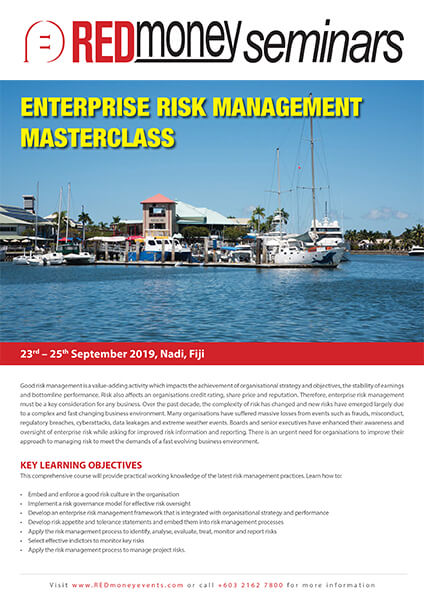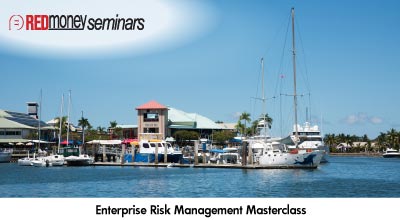About The Seminar
Good risk management is a value-adding activity which impacts the achievement of organisational strategy and objectives, the stability of earnings and bottomline performance. Risk also affects an organisations credit rating, share price and reputation. Therefore, enterprise risk management must be a key consideration for any business. Over the past decade, the complexity of risk has changed and new risks have emerged largely due to a complex and fast changing business environment. Many organisations have suffered massive losses from events such as frauds, misconduct, regulatory breaches, cyberattacks, data leakages and extreme weather events. Boards and senior executives have enhanced their awareness and oversight of enterprise risk while asking for improved risk information and reporting. There is an urgent need for organisations to improve their approach to managing risk to meet the demands of a fast evolving business environment.
KEY LEARNING OBJECTIVES
This comprehensive course will provide practical working knowledge of the latest risk management practices. Learn how to:
- Embed and enforce a good risk culture in the organisation
- Implement a risk governance model for effective risk oversight
- Develop an enterprise risk management framework that is integrated with organisational strategy and performance
- Develop risk appetite and tolerance statements and embed them into risk management processes
- Apply the risk management process to identify, analyse, evaluate, treat, monitor and report risks
- Select effective indictors to monitor key risks
- Apply the risk management process to manage project risks.
Seminar Agenda
- Risk definition
- Understanding risk causes, events and impact – The Bow Tie Diagram
- Linking risk to strategy, business objectives and performance
- Types of risks and risk interconnectivity
- Emerging risks and market trends
- Class discussion and experience sharing on emerging and rising risks in organisations
- ISO 31000 Risk Management Principles
- COSO ERM Principles
- ISO 31000 Framework
- COSO ERM Framework
- Definition of risk culture
- Key elements of a good risk culture
- How to embed, monitor and reinforce the desired risk culture
- Indicators of good risk culture
- Case studies and class discussion on risk culture
- Key elements of an effective risk governance model, the Three Lines of Defence
- Risk governance structure, and roles and responsibilities
- Risk appetite and risk tolerance – the difference
- Risk appetite and tolerance statements
- Risk assessment criteria, impact and likelihood scales and the risk rating matrix
- Embedding risk appetite and tolerance into risk management processes
- Establishing the scope, context and criteria
- Risk identification, analysis and evaluation
- Risk treatment strategies
- Risk monitoring and review
- Communication and consultation
- Recording and reporting
- Risk and Control Self-Assessments (RCSA)
- Key Risk Indicators (KRI)
- Scenario analysis
- Risk events and loss data collection
- Reporting risks to the Risk Committee and Board of Directors
- Types of reporting
- Establishing the context
- Establishing risk rating criteria for projects
- Identifying and assessing project risks
- Defining KRIs to monitor key project risks
- “Treatment” of project risks
- Communicating and consultation with relevant stakeholders
Date: 23rd – 25th September 2019
Venue: Sofitel Fiji Resort & Spa
- Business Heads
- Heads of Risk Management
- Risk Managers
- Compliance officers
- Line managers
- Auditors
Early bird : USD 1,799
Standard : USD 1,999 per delegate
2 delegates (5% Discount) : USD 1,899 per delegate
3 delegates (15% Discount) : USD 1,699 per delegate
4 delegates (20% Discount) : USD 1,599 per delegate
5 delegates (30% Discount) : USD 1,399 per delegate
If you are looking for an in-house training program or wish to send a group to an existing public program, kindly please contact Andrew Tebbutt at [email protected] or +603 2162 7802.
Learn More
Kindly complete the registration form and email to [email protected] or fax +603 2162 7810
For enquiries please contact:
Normariya Sariman
Account Manager, REDmoney Seminars
[email protected]
Direct Line: +603 2162 7800 ext 44
Ramesh Kalimuthu
Events Sales Director
[email protected]
Direct Line: +603 2162 7800 ext 65
Fax: +603 2162 7810
For sponsorship & speaking opportunities:
Andrew Tebbutt
Managing Director
[email protected]
Direct Line: +603 2162 7802
For marketing and media enquiries
Govina Selvanthran
Marketing Manager
[email protected]
Direct Line: +603 2162 7800 ext 22
Date: 23rd – 25th September 2019
Venue: Sofitel Fiji Resort & Spa
- Business Heads
- Heads of Risk Management
- Risk Managers
- Compliance officers
- Line managers
- Auditors
Early bird : USD 1,799
Standard : USD 1,999 per delegate
2 delegates (5% Discount) : USD 1,899 per delegate
3 delegates (15% Discount) : USD 1,699 per delegate
4 delegates (20% Discount) : USD 1,599 per delegate
5 delegates (30% Discount) : USD 1,399 per delegate
If you are looking for an in-house training program or wish to send a group to an existing public program, kindly please contact Andrew Tebbutt at [email protected] or +603 2162 7802./p>
Kindly complete the registration form and email to [email protected] or fax +603 2162 7810
About The Seminar
Good risk management is a value-adding activity which impacts the achievement of organisational strategy and objectives, the stability of earnings and bottomline performance. Risk also affects an organisations credit rating, share price and reputation. Therefore, enterprise risk management must be a key consideration for any business. Over the past decade, the complexity of risk has changed and new risks have emerged largely due to a complex and fast changing business environment. Many organisations have suffered massive losses from events such as frauds, misconduct, regulatory breaches, cyberattacks, data leakages and extreme weather events. Boards and senior executives have enhanced their awareness and oversight of enterprise risk while asking for improved risk information and reporting. There is an urgent need for organisations to improve their approach to managing risk to meet the demands of a fast evolving business environment.
KEY LEARNING OBJECTIVES
This comprehensive course will provide practical working knowledge of the latest risk management practices. Learn how to:
- Embed and enforce a good risk culture in the organisation
- Implement a risk governance model for effective risk oversight
- Develop an enterprise risk management framework that is integrated with organisational strategy and performance
- Develop risk appetite and tolerance statements and embed them into risk management processes
- Apply the risk management process to identify, analyse, evaluate, treat, monitor and report risks
- Select effective indictors to monitor key risks
- Apply the risk management process to manage project risks.
Seminar Agenda
- Risk definition
- Understanding risk causes, events and impact – The Bow Tie Diagram
- Linking risk to strategy, business objectives and performance
- Types of risks and risk interconnectivity
- Emerging risks and market trends
- Class discussion and experience sharing on emerging and rising risks in organisations
- ISO 31000 Risk Management Principles
- COSO ERM Principles
- ISO 31000 Framework
- COSO ERM Framework
- Definition of risk culture
- Key elements of a good risk culture
- How to embed, monitor and reinforce the desired risk culture
- Indicators of good risk culture
- Case studies and class discussion on risk culture
- Key elements of an effective risk governance model, the Three Lines of Defence
- Risk governance structure, and roles and responsibilities
- Risk appetite and risk tolerance – the difference
- Risk appetite and tolerance statements
- Risk assessment criteria, impact and likelihood scales and the risk rating matrix
- Embedding risk appetite and tolerance into risk management processes
- Establishing the scope, context and criteria
- Risk identification, analysis and evaluation
- Risk treatment strategies
- Risk monitoring and review
- Communication and consultation
- Recording and reporting
- Risk and Control Self-Assessments (RCSA)
- Key Risk Indicators (KRI)
- Scenario analysis
- Risk events and loss data collection
- Reporting risks to the Risk Committee and Board of Directors
- Types of reporting
- Establishing the context
- Establishing risk rating criteria for projects
- Identifying and assessing project risks
- Defining KRIs to monitor key project risks
- “Treatment” of project risks
- Communicating and consultation with relevant stakeholders
Seminar Speaker

Patricia Jalleh
Founder and CEO
(Enterprise Risk Associates,
Singapore)
Patricia Jalleh is the Founder and CEO of Enterprise Risk Associates, a boutique risk training and consultancy firm based in Singapore. She is a leading practitioner and expert in the operational risk industry and was recognised as one of the “Top 50 Faces for Operational Risk” by the Operational Risk & Compliance Magazine in January 2009. She has more than 25 years of experience in the financial services industry working in the fields of internal audit, technology, operations, operational risk management and risk strategy. She has held several leadership roles, including Executive Director for Risk Strategy and Group Head of Operational Risk Management at United Overseas Bank, Vice President of Operational Risk for Technology & Operations at DBS Bank, and Head of Operational Risk for Group Consumer Bank and Internal Audit Manager at Standard Chartered Bank.
Patricia has extensive experience in implementing operational risk management frameworks, policies, systems, tools and processes from the ground up, having pioneered the operational risk management function for a bank in 1996. At another bank, she was a lead member of their operational risk task force set up to develop and roll out an operational risk management framework within the Group. She has experience in training and building up ORM teams at new or merged bank subsidiaries. In 2009, she was instrumental in her bank achieving the QFC-Asian Banker Achievement Award for Risk Management.
Patricia’s expertise includes design and development of operational risk management frameworks, risk governance, risk appetite, policies, event/loss databases, internal controls, risk and control self-assessments, key risk indicators, scenario analysis and risk reporting. She has also developed frameworks for addressing new product and initiatives risk, business continuity risk, outsourcing risk and reputation risk.
She was the Chairman of the ASEAN Banking Association Sub-committee for Operational Risk (2007 – 2010), Chairman of the Operational Risk Management Task Force of the Association of Banks in Singapore (ABS) and member of the Risk Management Standing Committee of the ABS (2006 – 2010). She was a member of the Singapore Financial Industry Competency Standards Risk Management Advisory Panel and the Risk Management Working Group (2006 - 2011).
Patricia has delivered numerous presentations and trainings across Asia (Singapore, Malaysia, Hong Kong, Thailand, Indonesia, Philippines, Brunei, Taiwan, China, Vietnam, Cambodia). She is a trainer for the National University of Singapore Risk Management Institute (NUS-RMI) Specialist Diploma in Operational Risk Management and the Singapore Institute of Banking & Finance Certification in Operational Risk Management. She is also a trainer for the ISO 31000 Risk Management Standard and the GARP FRM (Financial Risk Manager) program.
Patricia is a Fellow of the Chartered Association of Certified Accountants, UK and a Certified Information Systems Auditor (CISA).
For enquiries please contact:
Normariya Sariman
Account Manager, REDmoney Seminars
[email protected]
Direct Line: +603 2162 7800 ext 44
Ramesh Kalimuthu
Events Sales Director
[email protected]
Direct Line: +603 2162 7800 ext 65
Fax: +603 2162 7810
For sponsorship & speaking opportunities:
Andrew Tebbutt
Managing Director
[email protected]
Direct Line: +603 2162 7802
For marketing and media enquiries
Govina Selvanthran
Marketing Manager
[email protected]
Direct Line: +603 2162 7800 ext 22

 Enterprise Risk Management Masterclass
Enterprise Risk Management Masterclass
